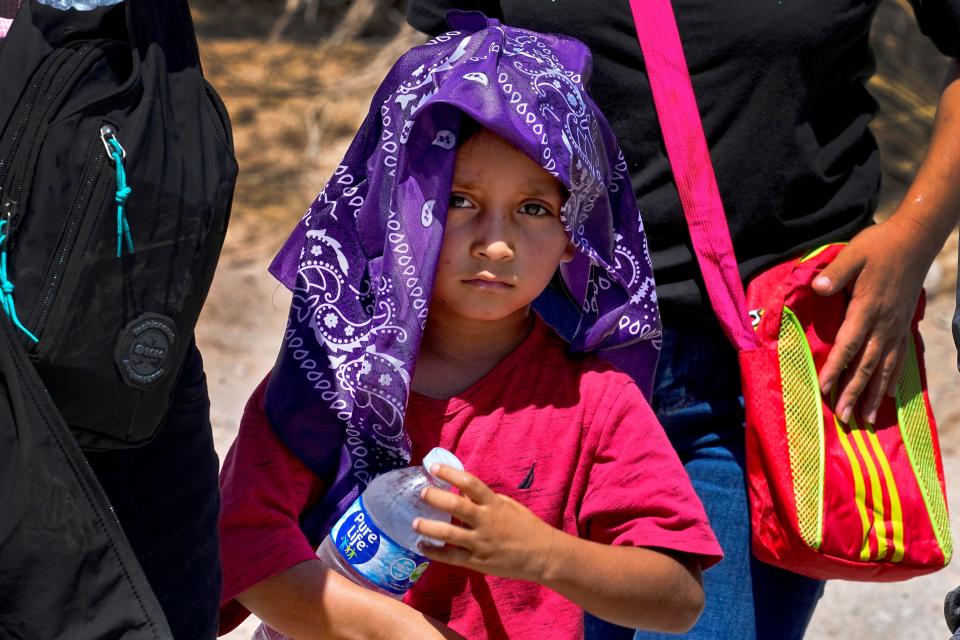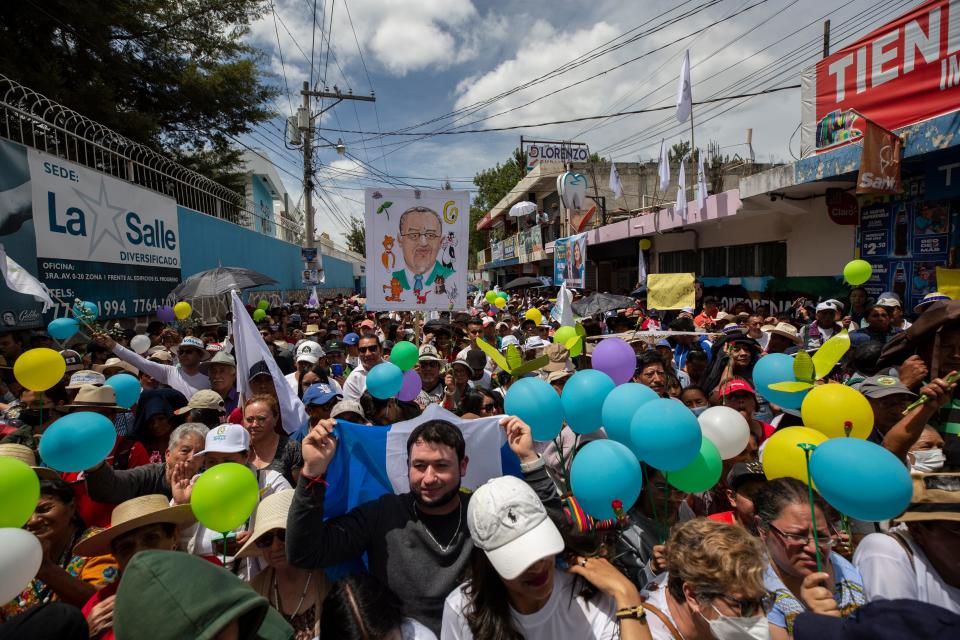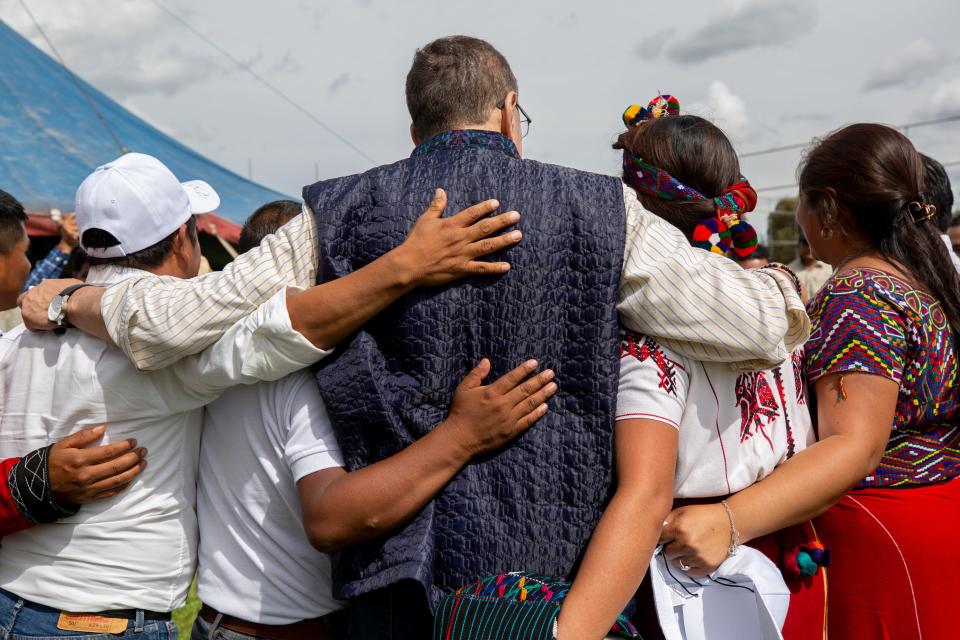Guatemalans in Phoenix hope president-elect can root out corruption and poverty
- Oops!Something went wrong.Please try again later.
- Oops!Something went wrong.Please try again later.
- Oops!Something went wrong.Please try again later.
- Oops!Something went wrong.Please try again later.
Phoenix resident Vivian Van Antwerp was in Guatemala visiting her mother when the historic runoff presidential election took place in August.
Her mother wasn't crazy about either candidate: former first lady Sandra Torres, the conservative political establishment candidate or Bernardo Arévalo, an anti-graft champion and political outsider.
But the choice was clear for Van Antwerp.
"I told my mom. You must vote for Arévalo," recalled Van Antwerp, a lawyer in Guatemala who has lived in the U.S. for 10 years. "If that woman (Torres) wins, Guatemala will be bankrupt even further and she's involved in narcotrafficking. At least Arévalo has principles."
Arévalo, the son of a former president, who started his campaign as a longshot candidate, ended up winning the Aug. 20 presidential election in a landslide.
For subscribers: Arizona to host presidential primaries for Dems, Republicans after GOP plan falters
Election gives many Guatemalans some hope
His promise to root out widespread, deeply seated corruption in the Guatemalan government, rebuild the economy and tackle inequities that contribute to a wide gap between rich and poor has given many Guatemalans some hope that Guatemala can become a country where huge numbers of people no longer have to migrate to the U.S. for a better life.
The president-elect "comes with a good plan that can help the people and Guatemala itself," said Antonio Velásquez, a Guatemalan community leader in Phoenix and founder of the grassroots soccer and advocacy organization Maya Chapin de Guatemala en Arizona. If the next president is successful, "this will help many people not to have to leave Guatemala."
In recent years, more Guatemalans have crossed the southern border illegally than any other country except Mexico and Honduras. Over the past four years, the Border Patrol has encountered Guatemalans more than 710,000 times, many of them parents arriving with children fleeing poverty, criminal gangs, and political corruption.

Arévalo is supposed to take office on Jan. 14. Guatemala's current president, Alejandro Giammattei, was limited to one four-year term. Instead of fighting corruption, Giammatei's government has arrested journalists, prosecutors and judges investigating corruption. Still, Giammattei has vowed an orderly transfer of power.
While Guatemalans in the U.S. are hopeful an orderly transfer of power will happen, many are worried Arévalo will be prevented from taking power by ruling elites with ties to corruption and organized crime, Velasquez said.
"Already they are going after members of Arévalo's party" called "Semilla" or Seed in English, Velasquez said. "They have come up with a thousand lies so they cannot take office in January."
Velasquez fears that if Arévalo is prevented from taking power, Guatemala could fall into the hands of an authoritarian government.
"And if Guatemala becomes a dictatorship, that will generate an exodus of migrants to the United States," Velasquez said.
Border Patrol: Tucson Sector sees 15-year high as advocates adapt to Lukeville migration shift
Officially, there are about 41,000 people of Guatemalan descent living in Arizona, including just under 20,000 Guatemalan-born immigrants, according to the Migration Policy Institute's tabulation of U.S. Census 2021 American Community Survey data.
But Velasquez believes those numbers are a large undercount, because many immigrants, including Guatemalans, were fearful of taking part in the 2020 census under the Trump administration's anti-immigrant policies. Velasquez estimates 125,000 Guatemalans, including immigrants and U.S.-born children, live in Arizona.
Guatemalans are the second largest Latino group in Arizona, behind Mexicans. Most of the Guatemalans who cross the border are headed to other states but growing numbers have settled in recent years in Arizona. Most of the Guatemalans in Arizona live in Maricopa County, with a large concentration on the west side of Phoenix, where Velasquez lives.
Who is Bernardo Arévalo?
Arévalo is the son of Juan José Arévalo, who became Guatemala's first democratically elected president in 1945 and served until 1951.
Juan Jose Arévalo"was much admired and much loved," said Eric Olson, director of policy and strategic initiatives at the Seattle International Foundation, which promotes civil society in Central America. "People generally have a very fond memory of him because it was a brief period in Guatemala's history where they actually had democratically elected presidents who were considered very legitimate and good leaders."
Bernardo Arévalo was born in Uruguay, where his father was living in exile following a CIA-backed coup in 1954 that ushered in decades of U.S.-backed authoritarian leaders in Guatemala.
Bernardo Arévalo is a co-founder of the anti-corruption Semilla Movement and was elected as a Guatemalan congressman in 2020 as a member of the Semilla party. He is a former diplomat and has a doctorate in philosophy and social anthropology.

Arévalo has a "connection to an important past that a lot of people refer to and think about as the high water mark in terms of democracy," Olson said.
At the same time, he is distanced "from the ruling economic and political class that has been so maligned in the last quarter century, at least... He was an outsider and not part of the hated status quo that was increasingly viewed as corrupt," Olson said.
Olson said he is hopeful Arévalo will assume power on Jan. 14, but he is concerned that Guatemala's ruling political classes will try and find a way to disallow him from becoming president and then let the Congress take over the process.
What's happening in Guatemala? How a small country's elections could have a big impact on the US
"The Congress is in the hands of very corrupt political parties, and one of those parties is the party of the second place finisher," Torres, Olson said.
Given Arévalo's popularity at the polls and his anti-corruption stance, Olson believes Guatemalans will take to the streets in protest, which could result in civil unrest, if he is not allowed to take power.
Guatemala is a country with a deep divide between rich and poor, Olson said. Guatemala's majority Mayan population is also majority poor, especially in the country's Western Highlands region, where many of the Guatemalans who migrate to the U.S. are from.
Fifty percent of Guatemalan children under 5 suffer from malnutrition, and 80% of the under-5 children in the heavily Mayan Western Highlands region suffer from malnutrition, Olson said.
In addition to fighting corruption and organized crime, Arévalo has vowed to tackle Guatemala's longstanding underinvestment in social policies to help the poor, Olson said.
"At the end of the day, the corruption and the extreme poverty and inequality is what is driving migration more than anything," Olson said. "And in places like Guatemala now, corruption, organized crime and poverty are intimately linked. Why is there no investment in the Western Highlands or why is it so bad? Because there's huge amounts of corruption."
U.S. Secretary of State Anthony Blinken expressed concern about efforts in Guatemala to disallow Arévalo's election.
"Such anti-democratic behavior, including efforts by the Public Ministry and other actors to suspend the President-elect’s political party and intimidate election authorities, undercuts the clear will of the Guatemalan people and is inconsistent with the principles of the Inter-American Democratic Charter," Blinken said in an Aug. 29 statement.

Velasquez, the Guatemala community leader, is calling on Guatemalans living abroad, the American people, the U.S. government and the international community to remain vigilant to help ensure Arévalo is not prevented from taking power.
Van Antwerp, the Guatemalan lawyer, said Arévalo's supporters won't tolerate attempts to keep him from becoming president on Jan. 14.
"The Guatemalan people are not dumb. They are already awakened. There have already been many, many protests," she said.
Daniel Gonzalez covers race, equity and opportunity. Reach the reporter at daniel.gonzalez@arizonarepublic.com or 602-444-8312.
This article originally appeared on Arizona Republic: Guatemalans hope president-elect will reduce corruption and poverty

